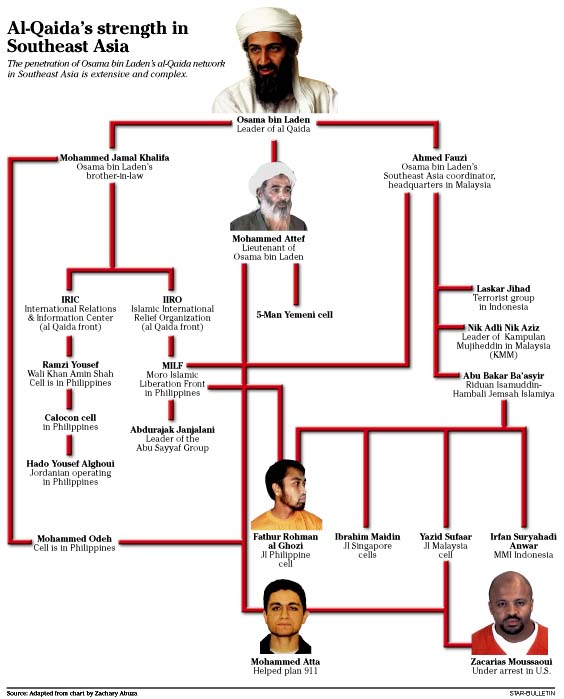


The Rising East
Al-Qaida invades
a world of frontiersEven though the war on terror seems to be winding down in the southern Philippines, a fresh, meticulously researched assessment concludes that the al-Qaida network with links to terrorist Osama bin Laden is pervasive throughout much of Southeast Asia and that the region is in for a long war.
The objectives of the Muslim extremists are to destroy the American presence in Southeast Asia, to overthrow the governments of Indonesia and Malaysia and set up regimes under Muslim law, and ultimately to establish a pan-Islamic nation comprising Indonesia, Malaysia, the southern Philippines and southern Thailand. The former two nations have Muslim majorities now and the latter two regions are heavily Muslim.
This analysis, by Zachary Abuza, a political scientist and director of the Asia program at Simmons College in Massachusetts, finds that the cell in Malaysia is the largest and is responsible for al-Qaida's finances. Singapore has been an operational center while the Philippines has been a logistics hub.
Abuza says the least is known about the cell in Indonesia, but that it may be the most dangerous because of the breakdown of government authority there.

"New ties between Indonesia and al-Qaida are being uncovered at an alarming rate," he says. "Until Indonesia begins to get serious about the threat of terrorism, it will remain al-Qaida's next great frontier."The leaders of the Southeast Asian terrorist movement have at least one thing in common: They were recruited in the 1980s to join the mujiheddin in Afghanistan in their 10-year struggle against invaders from the Soviet Union. About 1,000 Southeast Asians fought alongside 35,000 Muslim radicals from around the world. Moreover, the recruiting did not stop after the Soviets withdrew in 1988.
"Undeniably, the Afghanistan experience was the formative experience in the Southeast Asian jihadi's lives," Abuza writes. "One cannot underestimate how important the Afghan connection is; it was the basis for the al-Qaida network around the world."
Bin Laden has relied on relatives, including his brother-in-law, Mohammed Jamal Khalifa, and trusted lieutenants, such as Ahmed Fauzi, to assemble a loosely organized network in which each cell is autonomous but works closely with the others.
They have penetrated with two sorts of operations: First, they have set up independent cells, usually with a handful of members, some of whom are Arabs living in Southeast Asia. Second, they have played on political dissent, poverty or other dissatisfactions to take over organizations or companies and turn them into cogs within the al-Qaida network. Abuza says al-Qaida has been "brilliant" in co-opting local groups.
Al-Qaida's infiltration into Southeast Asia has been aided by corrupt governments and law enforcement agencies. "Thus terrorists are able to operate and plan attacks with little concern for their own security," Abuza says. In addition, porous borders make moving through the region relatively easy.
Financial links between Southeast Asia and the Middle East thrive on trade. "Malaysia is one of the world's pre-eminent Islamic banking centers," Abuza writes, through which money moves to finance terror. Setting up front companies "is very simple," he adds. Then "the region is awash in weapons" that are easy to obtain.
Against this backdrop, the al-Qaida terrorists planned an elaborate operation in 1995 called "Oplan Bojinka" to blow up 11 passenger airliners over the Pacific nearly simultaneously, killing 4,000 people. The plot was foiled not by good intelligence and police work but by an accident -- a fire broke out in a terrorist's apartment in Manila where chemicals were being mixed for the bombs.
The terrorists fled and some were later arrested. Nonetheless, a network called Jemaah Islamiya has survived and expanded with key cells in the Philippines, Malaysia, Singapore and Indonesia. It was founded in Indonesia in 1960 by a radical cleric named Abu Bakar Ba'asyir.
Ba'asyir left Indonesia in 1978 after serving a prison term of four years for subversion and has taken haven in Malaysia where he organized the present Jemaah Islamiya in 1995. He continues to live and preach openly, Abuza says.
The scholar, who also has done detailed research on dissidents in Vietnam, plans to publish his extensive findings in a book later this year.
Richard Halloran is a former correspondent
for The New York Times in Asia and a former editorial
director of the Star-Bulletin. His column appears Sundays.
He can be reached by e-mail at rhalloran@starbulletin.com